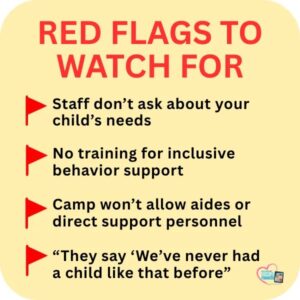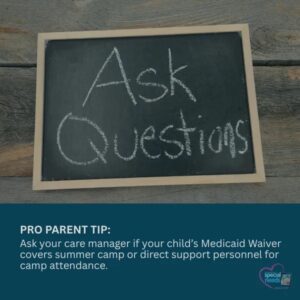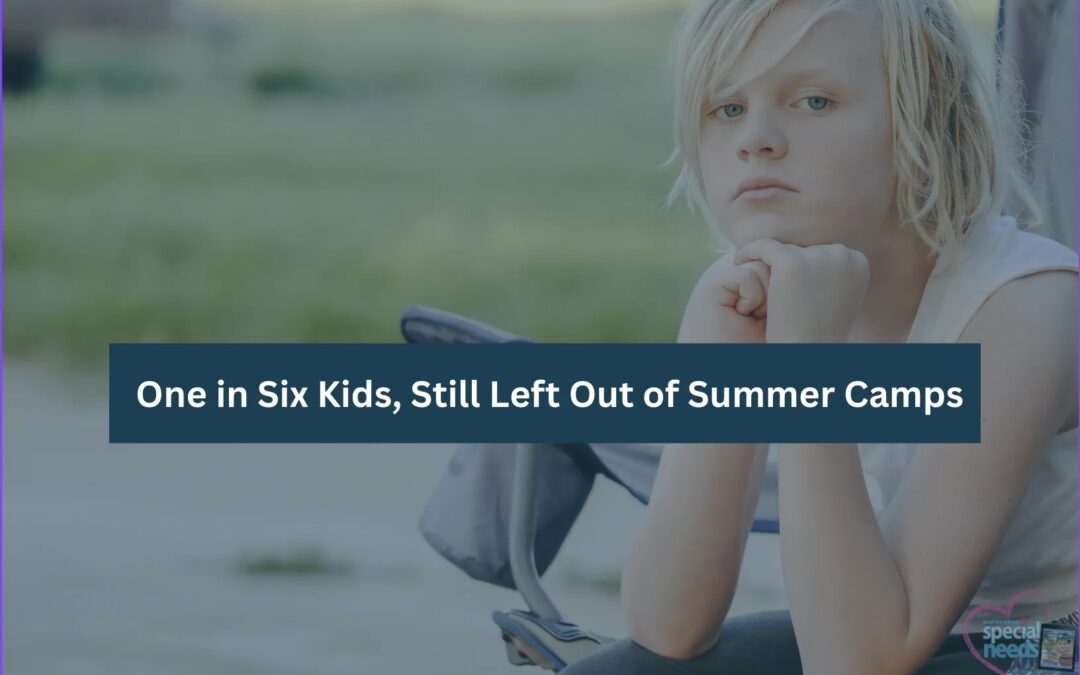parentingspecialneeds.mydigitalpublication.com
The first time I was told my son was “too much” for camp, I was stunned. For families like mine, raising one of the 1 in 6 kids with a disability, summer often means closed doors instead of carefree fun.
THE SUMMER CAMP DILEMMA
Summer days are anything but lazy for most parents. As school lets out, our structure and supports virtually disappear.
Most parents rely on summer camps to fill the school/after-school care void.
But if you’re reading this, you’re not most parents.
The Centers for Disease Control estimates that 1 in 6 American children ages 3 through 17 have one or more developmental disabilities, such as Autism, ADHD, Cerebral palsy, and Fragile X, to name a few.
Parents like us know that when a child needs extra support or even seemingly simple modifications for activities, summer camp options become limited, and, in some cases, obsolete.
The laws that give people with higher support needs access to a free and appropriate public education (FAPE) in the least restrictive environment (LRE) only apply to public schools. When it comes to virtually everything else, we’re on our own.
Even so-called “inclusive” camps limit the level of support they’ll provide. And some of the most well-intentioned programs have a surprisingly low tolerance for conditions or behaviors that are unfamiliar.
FACING HURDLES

The first hurdle we often face is implicit bias or outright ableism. Instead of seeing the whole child, folks running the camps see only the disability.
Or, when it comes to invisible disabilities, those in charge fail to meet the child where they are, instead setting impossible expectations because they present as neurotypical. In both instances, our children miss an opportunity to participate in the same fun, engaging experiences as their non-disabled peers. Camp organizers see a liability and extra work.
On the flip side, there are camps that welcome all children with open arms, but they’re oblivious to the additional needs a child may have. Parents fill out the paperwork and reach out to staff ahead of time to discuss ways to support their child, but it’s not taken seriously.
Throughout my oldest child’s 14 trips around the sun, we’ve experienced all of the above. When he was a toddler, I had to convince folks that he would be totally fine in a half-day camp. At that point, his needs weren’t that different from his peers, but organizers just saw Down syndrome.
As a preschooler, he was turned away from a “special” camp put on by speech language pathologists, occupational and physical therapists, because they deemed him “too much.” It was hurtful and infuriating. I wrote a scathing email pointing out how abhorrent their discrimination was.
IT DOESN’T ALWAYS GET EASIER WITH AGE

His elementary years of summer camp were a mixed bag. There was one at a science center where organizers assured me they read everything I sent and were excited to work with him.
A few hours into his first day, they called asking me to pick him up. It was clear they didn’t review what I had sent or train staff appropriately. I got a refund.
Later, I found an inclusive day camp that trained staff to work with children with high support needs.
It wasn’t perfect, but it was a breath of fresh air. It always is when people make an effort to include children with disabilities. Even though it’s not that hard to do, it’s incredibly rare.
SUMMER CAMP: A CHILDHOOD RITE OF PASSAGE
There are a few unicorns out there – summer camps that are genuinely inclusive and welcoming to all children.
One shining example is Camp Accomplish in Maryland. The Melwood Recreation Center has long focused on offering ALL children fully inclusive day and overnight camps. They’re now partnering with Children’s National Hospital to provide a fun and safe summer camp experience for kids with and without chronic health conditions and disabilities.
I toured the facility on April 21, 2016. It was the same day that Prince died, and I remember so vividly driving home with Purple Rain on repeat while my three babies nodded off.
Also seared into my brain was how ingrained truly inclusive practices were there. When I expressed concerns about my son’s elopement issues while walking around their sprawling fields, the staff assured me they knew how to handle it with a no-restraint policy.
As my interrogation continued, it became crystal clear that not only did they know what they were doing, but that I could (and did) learn from them.
Their medical support was impressive back then, too, and that was before the Children’s National partnership. Some of my friends swear by Camp Accomplish – our kids all had a blast there, and we all felt at ease knowing they were safe and happy.
My family relocated to central New York in 2019, and we have yet to find anything as innovative as Melwood’s offerings, but so much depends on where you live.
If you’re looking for something in your vicinity, Rare Parenting compiled a fairly comprehensive list of summer camps for kids with disabilities in 2024.
HOW TO FIND THE RIGHT CAMP
Finding the right summer camp for our children can require research and advocacy; unfortunately, location matters. And so does the amount of money you can spend.
Utilize Your Child’s Waiver
If your child has a disability/Medicaid waiver, you might be able to allocate funds specifically for camp or direct support personnel to be with your child at camp. Check with your child’s care manager.
Ask Around
Look to your local disability organizations and parent support groups. We are each other’s greatest resource. And we’re stronger if we advocate together.
I did a deep dive into this topic on an episode of my podcast, The Odyssey: Parenting. Caregiving. Disability. Titled “Why Are Summer Camps Inaccessible for So Many Children?”
ADVOCATE, EDUCATE, AND CONTINUE TRAILBLAZING
Advocate and Educate
Disability advocate and activist, the late Dave Hingsburger, said, “Never ask permission. Doing so implies that ‘no’ is an acceptable response.”
While I agree with this wholeheartedly, we at least need to do some digging when it comes to summer camps.
When we’re entrusting others with the care and safety of our children, we must make sure there is competent and understanding staff running the show.
Sometimes this requires us to fight for our child to be included. Sign your child up. Send in the paperwork. Set up meetings. Educate the staff. Have a backup plan.
Continue Trailblazing
It’s utterly exhausting to be alive in 2025 and still fighting for basic human rights of people with disabilities. When it all feels like too much, I think of the generations before us who fought for inclusion in schools.
I am so grateful for their trailblazing that got us where we are today. Whenever current injustices weigh heavily on me, I put myself in that trailblazer mindset: What will our generation’s legacy be?
What can we chip away at? Maybe if we fight for more inclusive summer programming, the next generation of parents can focus on something else, and so on and so on.
It helps to look at the amazing progress that’s been made to give us strength moving forward, toward the greater good.

Recent Comments